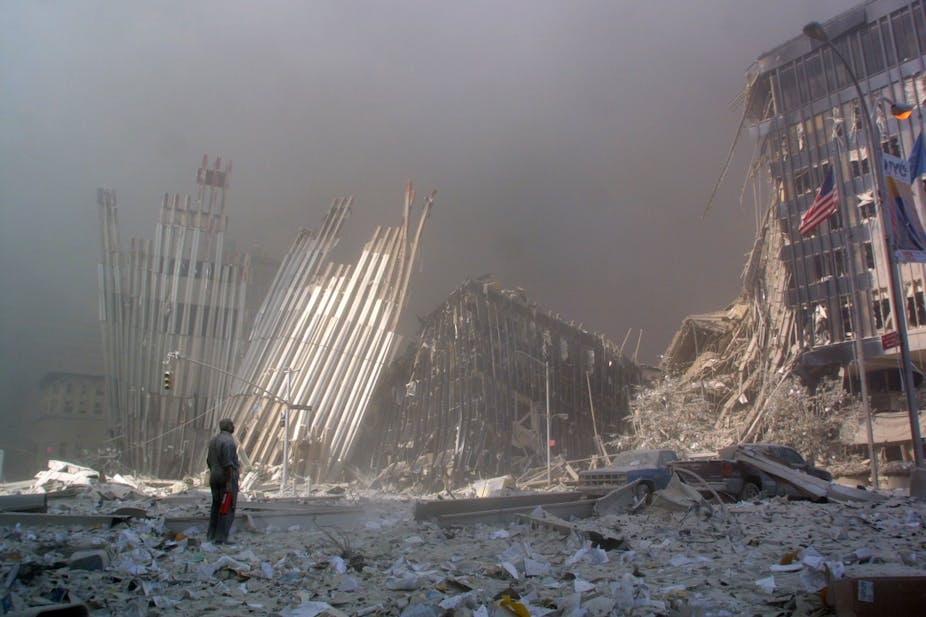The US military’s assassination of Osama bin Laden in North Pakistan is an important landmark in the “war on terror”. As the leader of al Qaeda he was the primary target of the military campaign to defeat global Islamist insurgency. But his death 10 years after 9/11, while important, does not defeat global jihadist terror.
9/11 changed the world. There was the immediate global impact of the attacks as an awesome spectacle and lives lost.
Then there was the longer term consequences of the “war on terror”. President George Bush’s declaration that “you are either with us or against us” divided the world into friends and enemies and Muslims into good and bad ones.
Miltary action
The “war on terror” saw the invasion of Afghanistan and then Iraq to stop further terrorism and intensified homeland security to prevent further attacks in the West.
It also greatly expanded transnational coordination and cooperation to hunt terrorists and police Muslim societies and communities abroad and in the West.
The “war on terror” did not shrink the international jihadist political project but expanded it geographically reaching into Muslim communities in the West.
Recruitment to radicalisation

9/11 recruited enthusiastic and inspired young Muslims to the global jihadist cause feeding on existing anti-Western and anti-American sentiment in the Muslim world.
It also alienated Muslims through their experience of becoming suspects and targets of “war on terror” in Muslim countries invaded to defeat jihadist terrorism. In the West they were seen as potential recruits to global jihadist terrorism.
Guantanamo Bay and Abu Ghraib became synonymous with Muslim humiliation and injustice at the hands of the US for much of the Islamic world.
The bombings in London in July 2005 were seen as a code for the menacing threat of “homegrown” terrorism for Western countries, Australia included.
Muslims in the West were told the “war on terror” was not against Islam. However their experience of homeland security did not reassure them.
The west judges Islam
The view of Muslims as transnational risks, anti-terrorism laws which targeted them as suspicious and government by the politics of fear of Muslims turned them into marginal citizens.
They were judged to be “good” or “bad” Muslims on the basis of their conformity with Western constructions of “moderate” Islam. The veil, Islamic clerics, and Islamic organisations have increasingly been policed as signs or sources of dangerous politicisation and even radicalisation. Muslim immigration to the West slowed and Islamphobia grew.
The influence of bin Laden

Osama bin Laden was the symbolic leader of the global Islamist jihadist project. He tapped into a longstanding Muslim anxiety about religious decline and the contemporary Muslim experience of cultural crisis engendered by globalisation as westernisation.
Bin Laden inspired many Muslims as a religious warrior fighting imperialism in Muslim countries, first Soviet imperialism and then American imperialism.
He will no doubt be seen by many Muslims as a martyr for the cause of the purification and revival of Islam and Muslim territories through violence.
But he was not the leader of a global Islamic organisation, party or army.
The al Qaeda franchises are loosely networked trading on the prestige of the brand.
The global jihadist project is organised horizontally and not vertically. It is a project which exists in the belief that there will be a transformation in society, and yet its goals are ill-defined.
Democratic uprisings
The recent Arab “spring” propelled by unarmed citizen protest against entrenched authoritarian governments in the Arab world is probably more significant in determining the fate of global jihadist terrorism than the death of Osama bin Laden.
This democratic politics of the street is the antithesis of the utopian and violent politics of the global jihad. Ironically Muslims alienated in the West who have not understood the change in political mood and street protest in their home societies may still feel more connected to the globalised Islam and vulnerable to the sirens of the virtualised global jihad.
If the democratic impetus for change in the Arab world offers hope for the marginalisation of global jihadist violence then the West needs to reciprocate by changing the security lens through which it has militarised the way we see our globalised world.
It has eroded our national perspective, undermined an earlier imagination of multiculturalism and joined us up to a transnational security project.
We urgently need to reassess our current social imagination and how globalised cultural difference can be lived with and not become a mode of governance to divide according to risk classifications.

